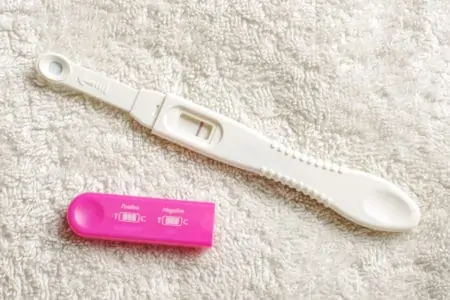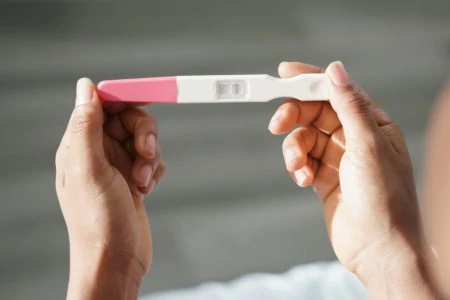Spotting a bit of blood when you aren’t expecting your period can be confusing. Is it the start of your cycle, or could it be implantation bleeding? If you are trying to conceive, that light spotting sparks a lot of hope.
Naturally, the next question is: How soon can I take a pregnancy test?
The “two-week wait” feels like an eternity. We know the urge to test immediately is strong, but timing is everything. Testing too early often leads to false negatives and unnecessary heartache.
Here is the lowdown on implantation, HCG levels, and the best time to take that test for an accurate result.
Key Takeaways
- Implantation timing: The fertilized egg usually attaches to the uterine lining 6 to 12 days after ovulation.
- Hormone spikes: Pregnancy tests detect human chorionic gonadotropin (HCG), which only begins rising significantly after implantation occurs.
- Best time to test: For the most accurate results, wait until the first day of your missed period (roughly 14 days past ovulation).
- False negatives: Testing too early, diluted urine, or checking the stick too soon can result in a negative test even if you are pregnant.
What Is Implantation?
After sperm fertilizes an egg, that egg has to travel down the fallopian tube to the uterus. The uterine lining (endometrium) thickens during this time, getting ready to catch the egg. This journey usually takes about six to ten days.
Once it reaches the uterus, the egg attaches itself and burrows into the lining. This process is called implantation. It takes a few days to complete and signals your body to set up shop for a baby. For some women, this burrowing causes light spotting (1).
Is It Implantation Bleeding or a Period?
Not everyone gets implantation bleeding. In fact, many women have no signs at all. However, if you do see spotting, it can be tricky to tell the difference between early pregnancy and your monthly visitor.
Here are a few clues to distinguish implantation bleeding from a normal period (2):
- Check the color: Implantation spotting is usually pinkish or dark brown (like old blood). Period blood typically turns a vibrant, bright red.
- Look for clots: Implantation bleeding rarely involves clots. If you see clots, it is likely your period.
- Duration matters: Implantation spotting is fleeting. It might last a few hours or up to three days. If the bleeding gets heavier and lasts four days or more, it’s probably menstruation.
- Timing is key: Implantation generally happens 6 to 12 days after ovulation. A period usually starts about 14 days after ovulation.
- Cramping intensity: Implantation cramps are usually mild, more like a prickling or pulling sensation. Menstrual cramps tend to be stronger and more intense.
What Happens After Implantation?
Once the egg implants, the real chemical shift begins.
During a normal cycle, if no egg implants, progesterone levels drop, the lining sheds, and you get your period. But if implantation is successful, the embryo signals your body to keep that lining intact.
This signal comes from the newly forming placenta releasing a hormone called human chorionic gonadotropin, or HCG.
This is the “pregnancy hormone” tests look for. Before implantation, HCG levels are almost non-existent. After the egg burrows in, HCG levels start to rise rapidly, doubling every 48 to 72 hours in early pregnancy.
However, this rise isn’t instant. It takes a few days for HCG to build up enough to turn a test strip pink.
Methods of Pregnancy Testing
You have two main options for checking HCG levels: a home urine test or a blood test at the doctor’s office.
1. Urine Tests for HCG
Home pregnancy tests work by reacting to the concentration of HCG in your pee. Their sensitivity is measured in mIU/ml (milli-international units per milliliter).
The lower the number, the more sensitive the test. Most sensitive tests range from 10 mIU/ml to 25 mIU/ml.
Some “early detection” tests claim to work up to six days before your missed period. While technically possible, these results are less reliable. At that stage, you are only about 8 to 10 days after ovulation (3).
If you test this early and get a negative, don’t panic. You might just need another day or two for your hormones to reach detectable levels. This is why many women get a false negative test initially.
2. Blood Tests for HCG
Blood tests are the gold standard for accuracy. They can detect pregnancy earlier than urine tests, sometimes as soon as 6 to 8 days after ovulation.
There are two types:
- Qualitative HCG: Simply gives a “yes” or “no” result.
- Quantitative HCG (Beta HCG): Measures the exact amount of hormone in your blood.
Doctors usually wait until you miss a period to order these, but they are useful if you are undergoing fertility treatments or have a history of complications.
How Soon After Implantation Should I Take a Pregnancy Test?
If you want to save money and avoid heartache, the best time to take a pregnancy test is the first day of your missed period.
We know, that is easier said than done.
If you suspect implantation happened (due to spotting or cramps), wait at least 4 to 5 days after those symptoms stop before testing. This gives your body time to produce enough HCG.
Testing too early can be misleading for several reasons:
- Late ovulation: You might have ovulated later in your cycle than you thought, meaning you aren’t as far along as you calculated.
- Low HCG baseline: Every woman produces HCG at different rates. Your levels might just be naturally lower in the beginning.
- Chemical pregnancy: Very early testing can sometimes detect a chemical pregnancy (a very early loss). Waiting until your missed period helps ensure the pregnancy is viable.
Many women have irregular cycles due to stress, illness, or normal fluctuations. Timing can be unpredictable, even if your periods are regular. Nearly 70% of women reach their fertile window earlier or later than expected. This will impact when HCG is detectable in your urine. If you ovulate one week later than anticipated, you will need to wait an extra week to get a positive pregnancy test (4).
Editor's Note:
Caitlin Goodwin, MSN, RN, CNMRemember, spotting in the luteal phase (the time between ovulation and your period) can sometimes just be a hormonal surge of estrogen, unrelated to pregnancy.
If you have other symptoms like extreme fatigue, nausea, or sore breasts, you might be tempted to take a pregnancy test early. Just keep in mind that a negative result today doesn’t mean it won’t be positive in 48 hours.
False Negative Pregnancy Tests
It is incredibly frustrating to “feel” pregnant but see a single line on the stick. If you get a negative result, you could still be pregnant. Here is why false negatives happen (5):
- You tested too early: This is the most common reason. There simply isn’t enough HCG in your system yet. Wait three days and try again.
- You didn’t wait long enough: Read the instructions. Some tests need a full two or three minutes to develop. Checking it after 30 seconds might show a blank window.
- Your urine was diluted: Drinking tons of water before testing can dilute your urine, making HCG harder to detect. Always use “first morning urine” for the highest concentration of hormones.
If your period still hasn’t arrived a week after a negative test, call your doctor. They can perform a blood test or an ultrasound to rule out other issues.
FAQs
To Test or Not to Test
While modern tests claim you can get results days before your missed period, early testing is a gamble. It often leads to confusion and the “squinting at a faint line” game.
Every body is unique. Your HCG production might be slower or faster than the norm. The best advice? Practice a little patience. Wait for that missed period. It saves you money on tests and saves your heart from the rollercoaster of false negatives.








